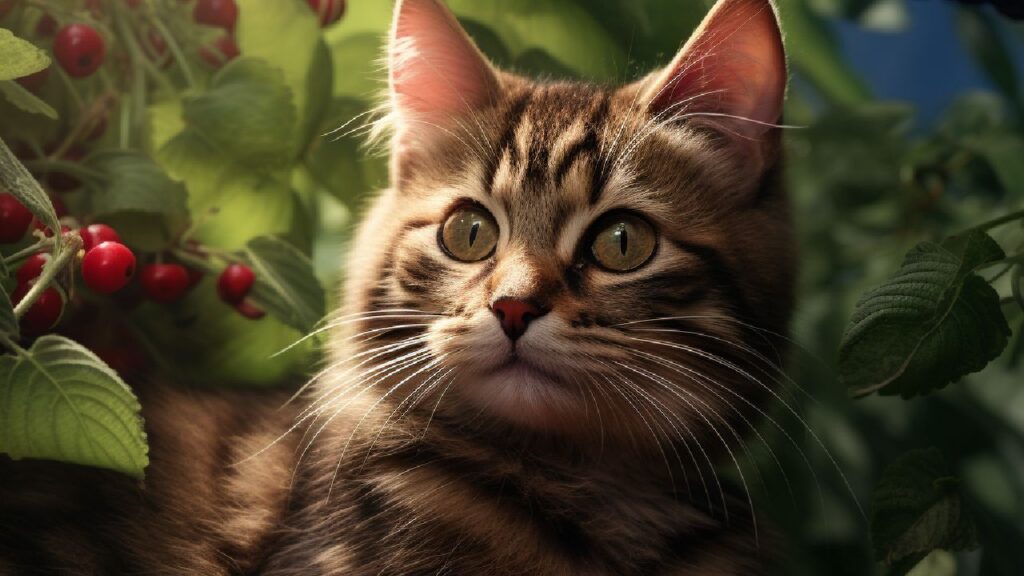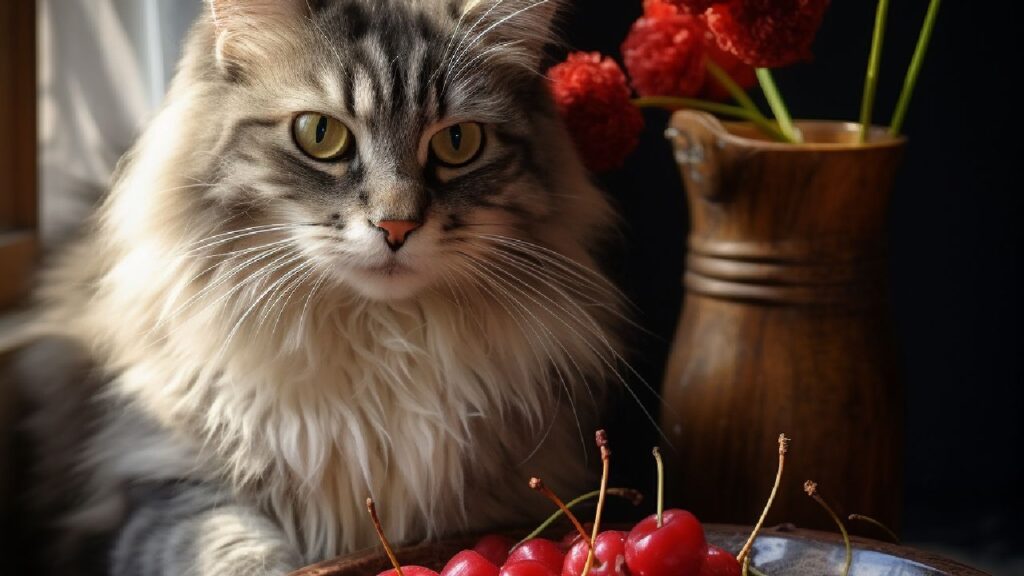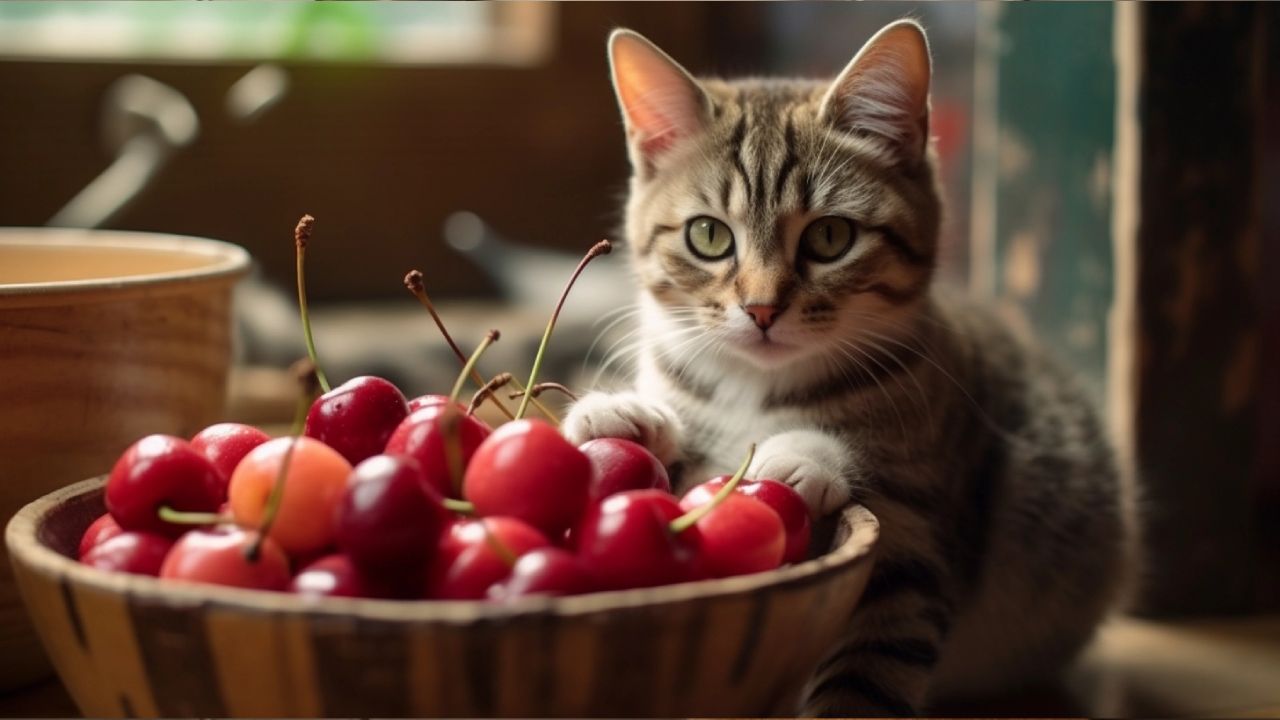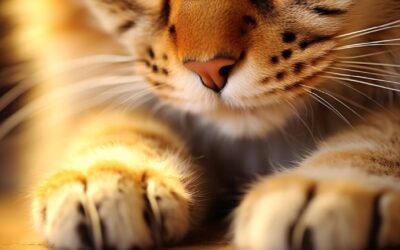Cats are renowned for their selective eating habits, and as responsible pet owners, it’s crucial to ensure that everything they consume is safe and healthy for them. One fruit that frequently raises questions among cat owners is cherries. The plain and simple answer is no. Cats must avoid cherries at all costs.
Cherries and other fruits like grapes and raisins pose a significant toxicity risk to cats due to certain compounds that can harm their digestive and urinary systems. This article will investigate whether cats can safely eat cherries, discussing their potential risks and benefits for your cherished feline companion.
Are Cherries Safe for Cats?
While the question of whether cherries are safe for cats has been answered with a resounding “no,” it’s crucial to delve deeper into why cherries are considered unsafe for our feline companions.
-
Toxic Compounds
Cherries, both the flesh and, more significantly, the pits and stems, contain cyanide compounds. These compounds can wreak havoc on a cat’s digestive system, leading to severe health issues. Even a tiny amount of cyanide ingestion can be life-threatening for cats.
-
Gastrointestinal Distress
If a cat were to nibble on cherries, they might experience immediate gastrointestinal distress. This distress can manifest as vomiting, diarrhea, and abdominal pain, causing considerable discomfort to your pet.
-
Kidney and Urinary Issues
The toxic compounds in cherries can also affect a cat’s kidneys and urinary system. This can lead to urinary tract problems, including painful urination and, in severe cases, kidney failure.
In light of these dangers, it’s evident that cherries should be strictly off-limits for your feline friend. As responsible pet owners, it’s essential to prioritize their well-being by avoiding any potential harm, including toxic foods like cherries.

Are Cherries Good for Cats?
While cherries may be a delightful and nutritious treat for humans, they are unsuitable for cats. Here’s why:
-
Lack of Nutritional Value
Cherries offer cats no significant nutritional benefits. Felines have specific dietary requirements that are distinct from humans. Their primary dietary needs are met by high-quality cat food, formulated to provide essential nutrients like protein, taurine, and vitamins for their well-being.
-
Allergic Reactions
Some cats may be allergic to the taste of cherries, which can cause allergic reactions such as skin rashes, itching, or gastrointestinal upset. Allergies can vary from cat to cat, so monitoring your pet closely when introducing new foods is essential.
-
Choking Hazard
The pits or stones inside cherries pose an additional risk to cats. If a cat were to swallow a cherry pit, it could become lodged in their throat or digestive tract, potentially requiring emergency medical intervention.
Given these factors, it is not advisable to consider cherries as your cat’s treat or food source. Instead, focus on providing a balanced diet of high-quality commercial cat food formulated to meet your feline friend’s dietary needs.

Should You Get Your Cat To Eat Cherries?
No, you should never attempt to get your cat to eat cherries or any food not specifically designed for feline consumption. Here’s why:
Even if your cat were to consume only the flesh of a cherry without the toxic parts, it can lead to gastrointestinal distress. Cats have sensitive digestive systems, and introducing unfamiliar foods can result in upset stomach, vomiting, and diarrhea.
Encouraging your cat to eat cherries can lead to unnecessary discomfort for your pet. Cherry and the taste of cherries do not offer any nutritional benefits to cats. Cats have specific dietary requirements that are met by high-quality cat food. Incorporating cherries into your cat’s diet does not provide any essential nutrients and can lead to an unbalanced diet.
How Many Cherries Can a Cat Eat?
Since cherries are unsafe for cats, there is no recommended quantity that they can safely consume. It’s best to avoid giving your cat cherries altogether and opt for treats and snacks designed for feline consumption.
Conclusion
Cats should not eat cherries because cherries can harm their health due to toxic compounds, particularly in the pits and stems. While cats may occasionally be curious about human foods, we are responsible for ensuring they have a diet that meets their unique nutritional requirements.
Instead of cherries, focus on providing your cat with high-quality cat food and approved cat treats to keep them happy and healthy.

FAQs
Can cats eat cherry tomatoes?
No, cherry tomatoes are not recommended for cats, either. They belong to the same family as regular tomatoes and can be potentially harmful to felines.
Are there any fruits that cats can safely eat?
Some fruits, like small amounts of fresh watermelon or cantaloupe, can be given as an occasional treat. However, always consult your veterinarian before introducing new foods into your cat’s diet.
What should I do if my cat accidentally eats cherries?
If you suspect your cat has consumed cherries, contact your veterinarian immediately. They can guide the appropriate action based on your cat’s specific situation.
Are there any symptoms to look for if my cat has eaten cherries?
Watch for symptoms like vomiting, diarrhea, lethargy, and difficulty breathing. If you notice any of these signs, seek prompt veterinary attention.
Can cherry-flavored cat treats be given to cats?
Cherry-flavored cat treats are designed to be safe for feline consumption, as they typically do not contain actual cherries or harmful compounds. However, it’s always wise to check the ingredient list and consult your veterinarian before introducing new treats to your cat’s diet.






I’ve had cats for years and never knew cherries could be harmful. Thanks for shedding light on this topic! I’ll make sure to keep those cherries away from my fur babies. They’re too precious to risk it. 🍒🐾